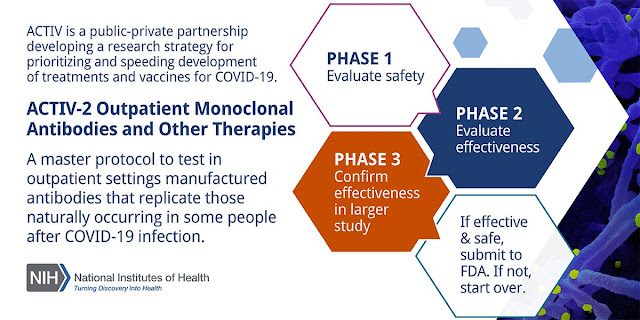NIH CLINICAL TRIAL TO TEST ANTIBODIES AND OTHER EXPERIMENTAL THERAPEUTICS FOR MILD AND MODERATE COVID-19
The National Institutes of Health (NIH) has initiated a phase 2 that will evaluate the safety and efficacy of potential new therapeutics for COVID-19, including an investigational therapeutic based on synthetic monoclonal antibodies (mAbs) to treat the disease. Researchers sponsored by the National Institute of Allergy and Infectious Diseases (NIAID), part of the National Institutes of Health (NIH), are working with clinical sites to identify potential patient volunteers currently infected with SARS-CoV-2, the virus which causes COVID-19, who have mild to moderate disease not requiring hospitalization. They will be invited to take an experimental therapy or a placebo as part of a rigorously designed randomized clinical trial. The trial, which is known as ACTIV-2, also may investigate other experimental therapeutics later under the same trial protocol.
If the investigational mAbs show promise, the study would expand from a Phase 2 to a Phase 3 trial to gather additional critical data from a larger pool of volunteers without delay. The trial will be led by the NIAID-funded AIDS Clinical Trials Group (ACTG) and will enroll participants at sites around the world.
ACTIV-2 was established as part of NIH’s Accelerating COVID-19 Therapeutic Interventions and Vaccines (ACTIV), a public-private partnership program instituted to speed development of the most promising treatments and vaccines. This study is also receiving support through Operation Warp Speed, the U.S. government’s multi-agency effort to develop, manufacture and distribute medical countermeasures to fight COVID-19.
The design of the study is adaptive to enable maximum flexibility in the shortest time frame. If the experimental treatment appears effective in the first stage, the treatment can be advanced rapidly to testing in larger groups of volunteers. The study also can be adapted to test additional therapeutics.
The first therapeutic to be tested in this trial will be LY-CoV555, an investigational monoclonal antibody made by Eli Lilly and Company (Indianapolis, Indiana). LY-CoV555 emerged from Lilly’s collaboration with AbCellera Biologics (Vancouver, British Columbia). Antibodies are infection-fighting proteins produced by immune cells. So-called neutralizing antibodies target specific viruses or other pathogens. This antibody, which was discovered by AbCellera in collaboration with NIAID’s Vaccine Research Center, was isolated from a blood sample from a recovered COVID-19 patient. Copies of this antibody were then synthesized in a lab—the term “monoclonal” refers to these laboratory-manufactured antibodies.
“Using an antibody generated by the immune system of a recovered COVID-19 patient gives us a jump start on finding a safe and effective therapeutic,” said NIAID Director Anthony S. Fauci, M.D. “Investigating a variety of different therapeutics, including monoclonal antibodies, will help ensure that we advance towards an effective treatment for people suffering from COVID-19 disease as quickly as possible.”
The initial stage of the trial is designed to enroll approximately 220 volunteers who report recently experiencing symptoms of COVID-19 and who test positive for the virus but are not hospitalized. Once enrolled, they will be randomly assigned to one of two groups: 110 volunteers will receive an intravenous (IV) infusion of LY-CoV555, and 110 volunteers will receive a placebo infusion of a saline solution. The infusion takes approximately an hour to deliver, and volunteers will be observed afterwards to note any reactions.
Over the next 28 days, participants will attend a series of clinic or at-home visits by clinicians to track their COVID-19 symptoms. Investigators also will check whether RNA from SARS-CoV-2, can still be detected in participants’ noses and saliva using a standard nasopharyngeal swab. Because people with COVID-19 often have unusually low blood oxygen levels, participants will receive pulse oximetry tests to help determine if the investigational therapeutic has a positive effect on blood oxygen levels. They also will give blood samples to help researchers understand how the experimental therapeutics are functioning in their bodies, as well as whether they are affecting the course of their SARS-CoV-2 infection. Participants will receive additional follow-up for up to 24 weeks.
The primary goals of the Phase 2 trial are to evaluate safety, to see if the investigational therapeutic can reduce the duration of symptoms through study day 28, and to see if the investigational therapeutic can increase the proportion of participants with undetectable virus in nasopharyngeal swabs at specific time points. If there are no serious safety concerns and if the investigational therapeutic appears to meet other specific other criteria (such as sufficiently reducing the duration of symptoms or the viral load in the volunteers’ bodies), the trial will transition to Phase 3 and enroll up to 1,780 additional outpatient volunteers, for a total of 2,000 trial participants.
The primary goal of the Phase 3 study will be to determine if the investigational therapeutic can prevent either hospitalization or death through study day 28 while also continuing to evaluate its safety. Participants in the Phase 3 portion of the study will not be provided nasopharyngeal swabs, though they will still perform self-collected anterior nasal swabs, and they will attend fewer clinic visits.
The study team is led by Protocol Chair Davey Smith, M.D., of the University of California, San Diego, David Wohl, M.D., of the University of North Carolina at Chapel Hill (UNC), and Kara W. Chew, M.D., and Eric S. Daar, M.D., both of the University of California, Los Angeles (UCLA),serve as protocol vice-chairs. The ACTG network is led by chair Judith Currier, M.D. (UCLA) and co-chair Joseph Eron, M.D. (UNC).



I’m going to read this. I’ll be sure to come back. thanks for sharing. and also This article gives the light in which we can observe the reality. this is very nice one and gives indepth information. thanks for this nice article... Antigen Test,
ReplyDeleteReally I enjoy your site with effective and useful information. It is included very nice post with a lot of our resources.thanks for share. i enjoy this post. antigen covid test
ReplyDelete